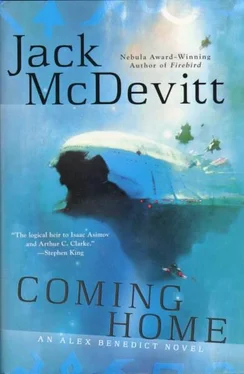I enjoyed watching Baylee perform. He had a sparkling sense of humor and a warm personality. But what really came across was his passion for history. At the Luganov Museum in Belgrade, he was shown a nineteenth-century vase. His eyes glowed as he looked at it, and he obviously wanted to touch it. His hosts urged him to go ahead, and finally he did, pressing his fingertips against it as if it were sacred. One of them even apologized, explaining that they’d have given it to him to take home if they could.
I watched him tour the Great Pyramid. And, on the Greek islands, stand with tears running down his face staring at the government building that now occupies the grounds which had once been home to the Acropolis. “Hard to believe,” he said to an interviewer, “that we could have been so stupid.” The Acropolis, of course, was destroyed during the Dark Age. Nobody knows the details.
“The most important thing we’ve done,” he said to an audience at Andiquar University, “was to get off-world. That was the single act that opened the universe to us. We owe all that to the men and women who made the Apollo flights possible and especially to those who put their lives at risk, and who sometimes paid the price, to actually ride the vehicles. They got us started. Once we’d set foot on the Moon, it was inevitable that we’d go on to Rimway and Dellaconda and the edge of the galaxy. We knew it would take a while. That we’d get in our own way. That we’d be discouraged by the vast distances involved simply in going to Mars. We understood that we were probably facing an empty and cold universe. But it was the beginning, and in our hearts we must have known we would not be stopped.” At that point, he paused and looked out across his listeners. “It is our severe loss that so little remains from that Golden Age. What would we not give to be able to hold in our hands the helmet Alan Shepard wore on that first fateful flight?”
He visited Coranthe, the city that had served as the headquarters of Mary Latvin, who brought light back to the world at the depths of the Dark Age. There’s a picture of him standing beside her statue, her mantra inscribed on its base: NEVERMORE.
It’s possible to watch him and his team at various dig sites, recovering artifacts. And celebrating after a visit to the Hadley Telescope, which is still in orbit, though of course it has not been used for three thousand years. The Hadley, of course, provided our first real clues about the conditions that led to the Big Bang.
Baylee loved to celebrate. Recover an artifact, locate a promising dig site, translate an inscription in a lost language, possibly just get under cover before the rains came, all were good reason to raise the glass.
Southwick and Winter showed up consistently. And on one occasion there were nine or ten of them in a modular hut drinking to Southwick, who, according to the caption, had saved Baylee’s life. No details were given, but Baylee’s left wrist was wrapped, and he looked unusually somber.
One celebration took place on the deck of a boat. It belonged to the Southwick Foundation, and was almost as big as the Belle-Marie . Baylee, Southwick, and a half dozen colleagues had just recovered the notebooks of Adrian Chang.
* * *
The record indicated that when Baylee returned to Rimway permanently in 1417, he’d been a different person. He declined speaking invitations, avoided conferences that, in earlier years, he’d attended with enthusiasm, and on two occasions he sent representatives to accept awards for him. He had never done that before. People who qualified as old friends found him difficult to reach. Southwick seems to have been the exception.
In a few personal letters published by others, Baylee revealed a sense of rage at the political leaders at the beginning of the Dark Age who, in his view, had through corruption and sheer stupidity allowed a glittering civilization to come apart. It wasn’t always clear precisely who he was talking about, and he probably wasn’t certain himself. Too much of the history of the period has been lost. It’s known the collapse was brought about primarily by economic failure and by the inclination of leaders to employ force over diplomacy. One comment by Baylee shows his frustration: “They had a technology that had taken them to the stars. They had stable governments, or at least most of them did. How could they possibly have given it all away? Look in their histories, and there are numerous comments about the development of a new Rome, about trying to do too much. Is that possibly what happened?”
He was talking about the West.
Most historians believe that there are historical cycles. They point to the Time of Troubles, which was still another collapse. Not as complete as the Dark Age (the second dark age, really), but nevertheless we came pretty close to going under again. Maybe it just happens every four or five thousand years. But Baylee’s bitterness extended beyond the general breakdown. He makes a particular point in arguing that maybe historians are right and we do live in a cycle, but there are some things that should be preserved. He doesn’t specify what, and I didn’t get the impression he was talking about artifacts. I suspect he had in mind the accomplishments of those who gave us science, who wrote the great books, who stood up to fanatics, and who took us to the stars.
Many historians credit the space effort with ultimately saving the human race. It could not have survived, they argue, had it been confined to Earth, with its population problems, its deteriorating climate, and the human propensity to make war. Baylee was not among them. He argues that we would have found a way without the interstellars. Population growth, he says, was already easing around the world before those first manned missions went out beyond the Oort Cloud. We’d backed off most of the practices that had damaged the environment. We’d have eventually stopped the warfare, as we have in fact done over these last few thousand years. With a few minor exceptions, of course.
“You don’t need faster-than-light,” Argent Pierson quotes him as saying. “All you need is enough sense to know when you’re in trouble. We have that. Sometimes it comes in a bit late. But when the chips are down, we’re pretty good at drawing the aces. What interstellar travel did for us was show us who we really were.”
* * *
“Hard to believe, isn’t it?” Alex said. “I can’t imagine this guy coming home with a Corbett transmitter, dropping it into a closet, and forgetting about it.”
“Does that mean we’re going to pursue this thing?”
He looked amused. “It’s exactly the kind of thing that Gabe would have loved to get involved with.”
“Maybe when the Capella shows up—”
“Yeah.”
It was supposed to be a joke. But I guess I should have thought before opening my mouth. It was unlikely Gabe would be getting off anytime soon.
* * *
Shara and I were back at the Hillside the following day. She seemed subdued. “Everything okay?” I asked.
“John’s desperate.”
“Why?”
“Because Plan A looks like a disaster.”
“You mean where we take as many off the ship as we can and let the rest go down the road for another five years?” I didn’t mean that to be as callous as it must have sounded.
“Chase, we can’t even be sure how long it will stay accessible. Nobody talks about that. At least not in public.”
“I thought you’d settled on ten hours.” The estimate kept changing, but it had never varied very much.
“That’s based on our experiences with the other ships. And with some experiments. But those were much smaller and they were in different time/space streams and the bottom line is that we don’t know what we’re doing. Not for certain.
Читать дальше












